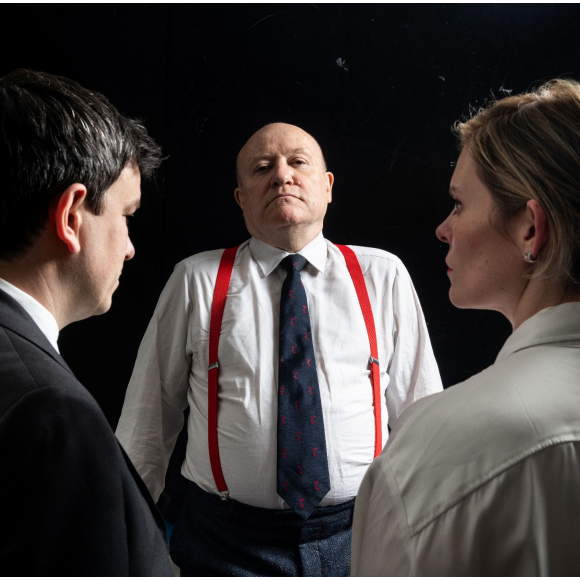The Playhouse, Sheffield – until January 18th 2025
Review by Sharon Farley
5*****
It’s useful to remember that the multi award-winning writer, Mike Bartlett (Cock, Chariots of Fire, Life), devised this play after witnessing a bullfight in Mexico City, which he found both disturbing and thrilling. This prompted him to focus on why we enjoy cruelty, and BULL achieves this with dialogue so cutting you’ll be grateful for the shielding of the fourth wall. The observation earned an Olivier Award for Outstanding Achievement in 2015 and remains a challenging piece as, under the glare of fluorescent lighting, the audience is exposed to the vicious manipulations of office politics. In the close proximity afforded to spectators by the intimacy of The Tania Moiseiwitsch Playhouse, this might feel more like watching a backroom bare-knuckle brawl than a bullfight.
BULL opens with the character of Isobel, excellently played by Rebecca Blackstone (The Sunshine Boys, Cool Hand Luke, Red Dwarf), observing the twitchy fidgeting of Thomas (Rob Ostlere: Holby City, Game of Thrones, Rough Crossing) as they await the start of a meeting in which one of their team will lose their job. Her steely glare might be interpreted as that of a matador observing the captive bull before the show begins.
Isobel starts by contemptuously mocking Thomas and is soon joined by Tony, played by Rilwan Abiola Owokoniran (Loves Labours Lost, Sandman, McDonald and Dobbs). Combining to mercilessly tear Thomas’ self esteem apart, their role is like that of the picadores, there to weaken the bull by thrusting sharp pikes into its neck and shoulders, aggravating its defence response and weighing it down. They achieve this by conspiring against him even before the meeting begins, and continue by voraciously humiliating him with personal jibes and spiteful goading that descends to the level of schoolyard bullying. Thomas knows he is being bullied and desperately tries to fend them off, but his futile attempts only leave him all the more pathetic as he becomes increasingly confused and panicked.
By the time their boss, Mr Carter (Tim Francis: Citadel, The trial of Christine Keeler, Machinal) arrives, Thomas’ mental state is already exhausted, and Tony immediately tricks him into humiliating himself further under Carter’s judgemental gaze. Carter proceeds to undermine and belittle Thomas before his inevitable public sacking. We might think that Carter has stepped into the ring as the matador to deliver this kill strike, but later we realise he is just the bandarillero there to push yet more painful, debilitating barbs under the skin of the helpless bull in this second act.
For the unfortunate Thomas, worse is yet to come, as Tony and Carter exit leaving him alone with Isobel. Initially, she shows him some pity, just as the bullfighter honours the bull, but despite Thomas being broken and spent, she continues to goad him with relentless cruelty until his only remaining defence is that of attack. It’s too late, he has nothing left and the matador is still strong, holding all the cards and doesn’t back off until the bull stops fighting back, whereby she deals the final humiliating blow.
Though excellently performed by the four actors – a result of perfect casting and masterful direction – this is at times difficult to sit through. The audience is encouraged to laugh along with Thomas’ attackers as the occasional humorous jibe is thrown at him. We may wonder why Thomas doesn’t leave the room after Carter fires him but, of course, the bull’s fate is sealed before he even enters the arena, as he has no option to leave until the performance is complete. There are multiple layers to be peeled away from this examination of corporate cut and thrust: the uneven playing field; the backroom conspiracies; the preliminary nods; and the judgemental classicism. We may be urged to view Thomas’ attack on Isobel as that of a misogynist revealing his true colours, but is it misogyny or desperate self-defence? We might also ask ourselves who we relate to most, the winners or the loser?
Good art provokes a response, and as a think piece examining human behaviour, this is brilliant and well deserving of the accolades received. Perhaps it should also serve to demonstrate how, like bullfighting, this is a behaviour that might best be consigned to the bin of a shameful past. But just as the disturbing spectacle of bullfighting continues as a cultural tradition, the heavily biased inequality gap of current society also becomes increasingly wider. Maybe this dog eat dog performance is a sharply relevant commentaryon the way we are destined to continue.

